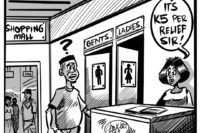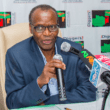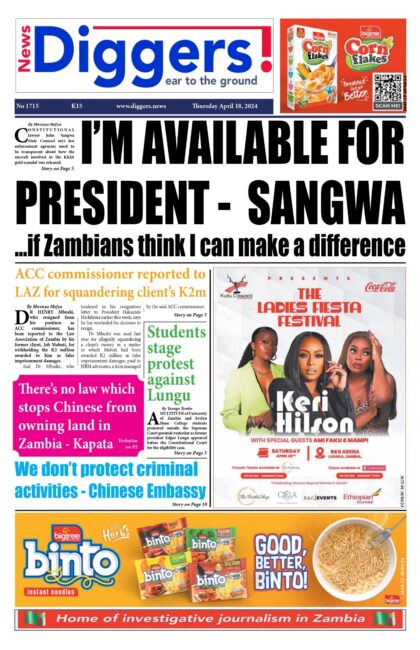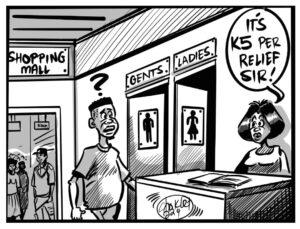Justice Minister Given Lubinda says under the current Constitution, government will give more campaign funds to political parties with more members of parliament.
Speaking when he featured on Hot FM’s Hot Seat programme today, Lubinda said that political parties needed to be controlled on the amount of money to use during campaigns as they would have to account for every bit of it.
“The Political Parties Bill intends to create mechanisms for political parties that receive funding from government to be held accountable for the funds that they receive from government. However, it goes further in that it also attempts to introduce mechanisms that make political parties accountable for all the funds that they have so that they can disclose their sources of funding. Political parties must be controlled on the amount of money they use during campaigns. So the bill is not only concerned about the funding they receive from government, it is concerned about the total management of political parties,” Lubinda said.
“Funding a political party is not a problem and I am not saying it’s a problem but the drafters of the bill have looked at various countries which have similar legislation and they have found that in those jurisdictions, political parties are bound by law to disclose their sources of funding. The reason for this is because you don’t want to have people who are aspiring to government leadership whose funding is suspicious. Imagine if a political party was to be funded by terrorist groups, when that political party ascends to government then you are in trouble because those terrorist groups will start to govern through the people who they sponsored to those positions.”
Lubinda noted that the Bank of Zambia recorded an unprecedented amounts of strange transactions of money believed to have been brought in the country to finance political campaigns in 2016.
“You may also want to take a look at the financial intelligence report of 2016 which was published early this year. In there you will see that unlike the years before, in 2016 just after elections, the financial intelligence unit of the Bank of Zambia recorded an unprecedented amounts of strange transactions. Money was moving from one account to another and a lot of it was coming into Zambia from outside during that period and obviously that gives you questions on the motive of the money coming into the country at that time, for me it was obviously for financing campaigns. I am not saying this is for a particular political party, I am just speaking generally. So it is in the interest of the state that such transactions are monitored so that political parties can, through the state explain to the people their sources of funding,” Lubinda said.
And Lubinda said arguing whether the country had the capacity to finance political parties at the moment was out of question because it was provided for under the Constitution.
“That question [of whether the country has money to finance political parties], that should have been asked when people where still making their submissions to the Mung’omba review commission, not to ask those questions now. Remember what happened when there was that Constitution making process, I was one of those that did not take part in the Constitution making and the reason I did so was well explained. I am glad that I boycotted and I did not earn any money from that process and there are a lot of others who took part in it like faith based organisation, civil society organisations, and political parties all went and took part in the review of the Constitution and it is them who put in this article. So if you ask, are there any priorities that are better than funding political parties? In this day and age, all I can say is that it’s in the Constitution and we are bound by what is in the Constitution,” he said.
“Unless someone comes up and convinces everybody that they amend the constitution. In any case, I am afraid that we have it enshrined in our supreme law and if we don’t follow it, some very active bodies will take us to the Constitutional Court and say government is not implementing the provisions of the Constitution, article 60. Sub Article 4A of Article 60 is very clear that ‘there shall be established a political parties fund which shall be prescribed by an Act of Parliament’ and it goes further unfortunately, the Constitution goes further to say that ‘this fund shall be provided to political parties that have seats in Parliament’. So I am bound by that and government is bound by that until and unless the Constitution is amended.”
Asked if it was true that political parties that did not have representatives in Parliament could not be catered for in the political parties fund, Lubinda admitted adding that the money would be released based on the number of seats a particular party had.
“To the extent that political funding is concerned yes they are right, for this sitting of Parliament, the 12th session yes it will only benefit those political parties that have got seats in Parliament and it’s not a matter of argument. The political parties that have the largest number of seats in Parliament will benefit the largest because the law says that the funds should go to those political parties that have seats in Parliament. The money will be realised to political parties based on the number of seats that they have, so those parties that have no seats in Parliament will benefit nothing because that’s what the law says. So yes I understand the complaints of the political parties that have no seats in parliament but look at this from a bigger picture,” Lubinda said.
Meanwhile, Lubinda asked stakeholders who were unhappy that the President was the appointing authority of members to seat on the political parties board, to include their complaints in their submissions.
“You may have noticed that all the time I have been interviewed about the political parties bill, I have restricted myself to the principles that are provided in the Constitution. When it comes to the bill itself, I have resisted debating it because that is a draft. The Ministry of Justice wrote a draft and gave it to the people and it is now entirely up to the people of Zambia to say ‘okay this we like and this we don’t like’. So what we will present to Parliament is the outcome of the consultative process. I have heard people who have said they don’t like the idea of the President being the appointing authority, fine! Please send your submission by all means and argue your case and if all the participants agree, we will amend it,” said Lubinda.












